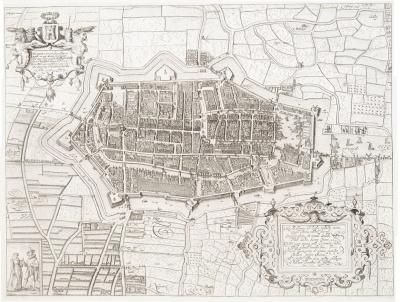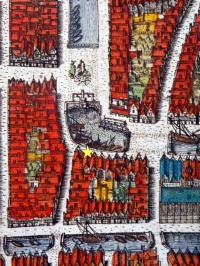Dossier:Drebbels Etches: Difference between revisions
No edit summary |
mNo edit summary |
||
| (6 intermediate revisions by the same user not shown) | |||
| Line 1: | Line 1: | ||
Collected information about the etches Drebbel made.<br/> | <big>'''<big>🕮</big> zie ook [https://drebbel.net/wiki/images/6/6c/Boekscout_Van_Onna_Drebbel_20_juni_2023.pdf#page=31 Huberts boek (p. 30 e.v.)]'''</big> | ||
<br> | |||
''Italic text''Collected information about the etches Drebbel made.<br /> | |||
{| style="width: 1285px;" | {| style="width: 1285px;" | ||
|- valign="top" | |- valign="top" | ||
| style="width: 719px; border: solid; border-color: black; border-width: thin; padding: 1em;" | | | style="width: 719px; border: solid; border-color: black; border-width: thin; padding: 1em;" | | ||
Drebbel was an engraver by profession when living in Holland at | Drebbel was an engraver by profession when living in Holland at [https://nl.wikipedia.org/wiki/Haarlem Haarlem] and [[Dossier:Drebbel in Alkmaar| Alkmaar]] as a pupil of his brother-in-law, Hendrick Goltzius and, as was quite usual in those days, he published his engravings himself. These engravings, though rare and few in number, are excellent, especially a '''[[1597 Alkmaar Map|map of the city of Alkmaar engraved in 1597]]''', which is a masterpiece. Click '''[[1597_Alkmaar_Map_enlarge|here]]''' for an enlarged view. The copper plate of this engraving is preserved to this day in the Municipal Archives of Alkmaar. Other engravings, too, which are still left to us all show clearly how expert Drebbel was in handling the burin or engraver's chisel. Those still extant are: | ||
*The '''[[De zeven kunsten|Seven Liberal Arts]]''' (Septem Artes Liberales), after Hendrick Goltzius. The three most interesting of these are shown in our illustrations, namely: Grammar, Music and Astronomy. In the right hand lower corner of the representations of the two last named we see clearly Drebbel’s monograms, probably the same kind of monograms with which he later hall-marked his instruments. | *The '''[[De zeven kunsten|Seven Liberal Arts]]''' (Septem Artes Liberales), after Hendrick Goltzius. The three most interesting of these are shown in our illustrations, namely: Grammar, Music and Astronomy. In the right hand lower corner of the representations of the two last named we see clearly Drebbel’s monograms, probably the same kind of monograms with which he later hall-marked his instruments. | ||
*'''[[PDF:1596+- Drebbels Etches|3 Etches by Drebbel]]''' (after Karel van Manderen): <blockquote> | *'''[[PDF:1596+- Drebbels Etches|3 Etches by Drebbel]]''' (after Karel van Manderen): <blockquote> | ||
*Juno, after Karel van der Mander, an artist known especially on account of his 'Book of Painters', in which he discussed many painters, ancient and modern (1604). Like Drebbel he was an anabaptist. | |||
*The Judgement of Solomon, after Karel van der Mander. | |||
*Esther and Ahasverus, after the same artist.</blockquote> | |||
</blockquote> | |||
*One of a series of five engravings, after H. Goltzius representing '''[[PDF:1596 Zintuigen Etsen|The five senses]]''', which appeared in 1596. The four others, Sight, Hearing, Smell and Taste, were cut by Nic. Clock; only the last, Feeling, was done by Drebbel | *One of a series of five engravings, after H. Goltzius representing '''[[PDF:1596 Zintuigen Etsen|The five senses]]''', which appeared in 1596. The four others, Sight, Hearing, Smell and Taste, were cut by Nic. Clock; only the last, Feeling, was done by Drebbel | ||
| Line 16: | Line 19: | ||
For the sake of completeness, 3 etches by<span style="line-height: 20.7999992370605px;"> Hendrick Goltzius' stepson</span>''' [[PDF:1600+- Goltzius Etches|Jacob Goltzius]] / '''Matham. | For the sake of completeness, 3 etches by<span style="line-height: 20.7999992370605px;"> Hendrick Goltzius' stepson</span>''' [[PDF:1600+- Goltzius Etches|Jacob Goltzius]] / '''Matham. | ||
| style="border: none; padding: 1em; width: 504px;" | | | style="border: none; padding: 1em; width: 504px;" |[[File:1597 Alkmaar CD kaart.jpg|thumb|left|400x1384px|link=1597_Alkmaar_Map_enlarge]] | ||
[[File:1597 Alkmaar CD kaart.jpg|thumb|left|400x1384px| | |||
{| | {| | ||
|- valign="top" | |- valign="top" | ||
| [[File:Map of Alkmaar detail.jpg|thumb|left|200x2255px|Map of Alkmaar detail.jpg]] | |[[File:Map of Alkmaar detail.jpg|thumb|left|200x2255px|Map of Alkmaar detail.jpg]] | ||
| | | | ||
| style="width: 267px;" | <span style="line-height: 20.7999992370605px;"><u>'''Note:'''</u> Cornelis Drebbel, was born in</span><br/><span style="line-height: 20.7999992370605px;">1572 at Verdronkenoord (yellow star)</span><br/><span style="line-height: 20.7999992370605px;">in Alkmaar. Two men on the Mientbrug:</span><br/><span style="line-height: 20.7999992370605px;">Adriaen Antoniszn, the surveyor and</span><br/><span style="line-height: 20.7999992370605px;">Cornelis Drebbel the innovator ?</span><br/> | | style="width: 267px;" |<span style="line-height: 20.7999992370605px;"><u>'''Note:'''</u> Cornelis Drebbel, was born in</span><br /><span style="line-height: 20.7999992370605px;">1572 at Verdronkenoord (yellow star)</span><br /><span style="line-height: 20.7999992370605px;">in Alkmaar. Two men on the Mientbrug:</span><br /><span style="line-height: 20.7999992370605px;">Adriaen Antoniszn, the surveyor and</span><br /><span style="line-height: 20.7999992370605px;">Cornelis Drebbel the innovator ?</span><br /> | ||
|} | |} | ||
| Line 29: | Line 31: | ||
---- | |||
[[Category:Etsen|!]] | |||
[[Category:Etsen|!]] [[Category:Dossiers|X | [[Category:Dossiers|X]] | ||
Latest revision as of 11:44, 10 July 2023
🕮 zie ook Huberts boek (p. 30 e.v.)
Italic textCollected information about the etches Drebbel made.
|
Drebbel was an engraver by profession when living in Holland at Haarlem and Alkmaar as a pupil of his brother-in-law, Hendrick Goltzius and, as was quite usual in those days, he published his engravings himself. These engravings, though rare and few in number, are excellent, especially a map of the city of Alkmaar engraved in 1597, which is a masterpiece. Click here for an enlarged view. The copper plate of this engraving is preserved to this day in the Municipal Archives of Alkmaar. Other engravings, too, which are still left to us all show clearly how expert Drebbel was in handling the burin or engraver's chisel. Those still extant are:
For the sake of completeness, 3 etches by Hendrick Goltzius' stepson Jacob Goltzius / Matham. |
|

